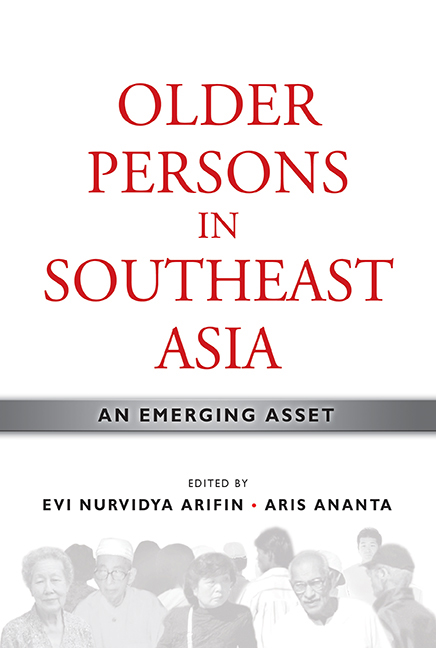Book contents
- Frontmatter
- Contents
- List of Tables
- List of Figures
- Foreword by Hal Hill
- Message from the Director
- Preface
- Contributors
- PART I INTRODUCTION
- PART II OLD-AGE INCOME SECURITY
- PART III EMPLOYMENT AND OTHER SOURCES OF FINANCIAL CONTRIBUTION
- PART IV AGEING, MIGRATION, AND DEVELOPMENT
- PART V ROLES OF GOVERNMENT AND CIVIL SOCIETY
- 14 Ageing, Finance, and Civil Society: Notes for an Agenda
- 15 Evaluation and Implementation of Ageing-related Policies in Indonesia
- Index
15 - Evaluation and Implementation of Ageing-related Policies in Indonesia
from PART V - ROLES OF GOVERNMENT AND CIVIL SOCIETY
Published online by Cambridge University Press: 21 October 2015
- Frontmatter
- Contents
- List of Tables
- List of Figures
- Foreword by Hal Hill
- Message from the Director
- Preface
- Contributors
- PART I INTRODUCTION
- PART II OLD-AGE INCOME SECURITY
- PART III EMPLOYMENT AND OTHER SOURCES OF FINANCIAL CONTRIBUTION
- PART IV AGEING, MIGRATION, AND DEVELOPMENT
- PART V ROLES OF GOVERNMENT AND CIVIL SOCIETY
- 14 Ageing, Finance, and Civil Society: Notes for an Agenda
- 15 Evaluation and Implementation of Ageing-related Policies in Indonesia
- Index
Summary
The existence of older persons among the population of the Indonesian archipelago, proclaimed by Soekarno and Hatta to be independent on 17 August 1945, has become increasingly more important. The Republic of Indonesia consists of more than 10,000 large and small islands and about 1,000 ethnic and subethnic groups. It is actually a very complex and diversified country in geographic, ethnic, religious, social, and cultural contexts. Indeed, Indonesia has made significant progress in its economic and human development which has resulted in better socio-economic indicators. The majority of the population resides on the islands of Java and Bali, where fertility and mortality rates have been relatively low. Therefore, the majority of older persons lives on these islands. The Javanese is the ethnic majority in the country, accounting for about 41.7 per cent of the total population. Muslims are the predominant religious followers, forming 88.2 per cent of the population of 201 million in 2000.
Presently, the Indonesian population is considered an aged-structured population. The percentage of older persons — those aged 60 and above — was 7.3 per cent in 2005, an increase from 4.5 per cent in 1971. This segment of the population is growing at a rapid pace and estimated to be above 20.0 per cent by the middle of this century. The percentage of its oldest persons (those aged 80+ and above) to the total population will grow even more rapidly from below 0.5 per cent in 1950 to slightly below 5.0 per cent in 2050; a more than tenfold increase in 100 years. Thus, the rapidly ageing population should become an important policy issue. Similar to many developing countries, Indonesia has just been experiencing a demographic dividend at the beginning of this century with some provinces experiencing this phenomenon earlier. There are five provinces (Central Java, Yogyakarta, East Java, Bali, and West Sumatra) having more than 8.0 per cent of its population aged 60 and above. These provinces were mostly located on the islands of Java and Bali, except for West Sumatra. In other words, Indonesia has been in transition into an ageing society. Therefore, there must be a commitment from the government at all levels — national, regional and local — to develop policies, programmes and the necessary budget for the establishment of an agefriendly system to accommodate a society for all ages.
- Type
- Chapter
- Information
- Older Persons in Southeast AsiaAn Emerging Asset, pp. 392 - 414Publisher: ISEAS–Yusof Ishak InstitutePrint publication year: 2009



